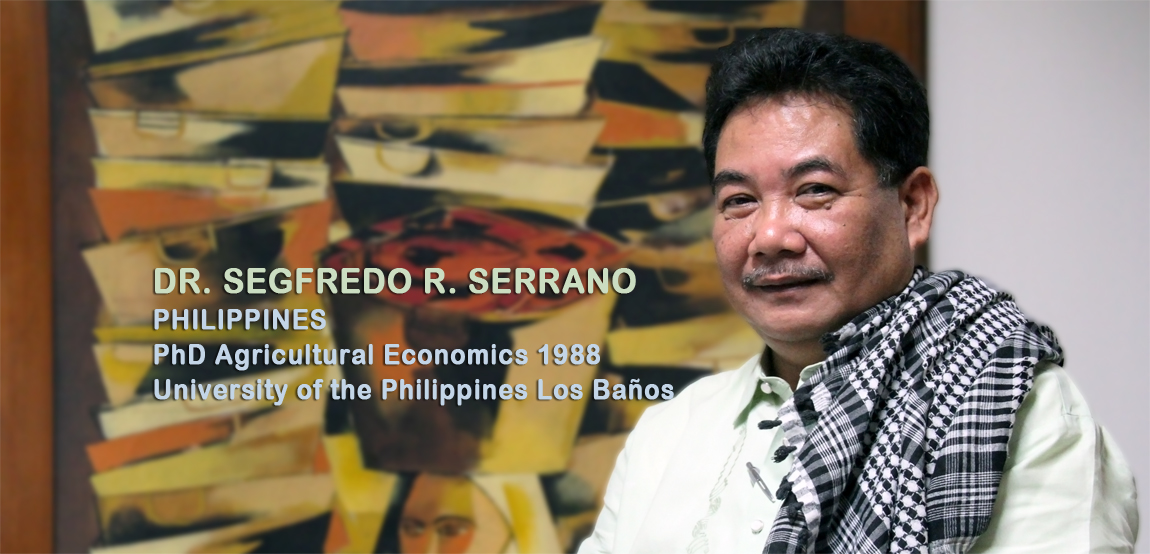With his more than 18 years of affiliation with the country’s agricultural sector, Dr. Segfredo R. Serrano, the Department of Agriculture (DA) Undersecretary for Policy and Planning, has provided the agriculture ministry the critical “institutional memory” and expertise that is being used in crafting national agricultural policies and programs with strong convictions about the long-term welfare of the Filipino farmer.
But if you look closely at the legacy of USec Serrano, he is considered an effective policy-maker because he is very inclusive -- in the process of making informed decision, he has been known to involve the civil society -- which is not the norm among technocrats in the Philippines. As a “Reformist Technocrat,” Usec Serrano’s practice has yielded positive returns not just to the country, but also for the region.
At the international front, he took the lead as the chief negotiator for agriculture and fisheries in all international trade negotiations such as the World Trade organization, ASEAN Trade in Goods Agreement (ATIGA), Regional Comprehensive Economic Partnership (RCEP), Philippines-Japan Economic Partnership Agreement (PJEPA), and Trade and Investment Facilitation Agreement (TIFA) with the United States of America. As DA’s World Trade Organization (WTO) Negotiator and Chair of the Task Force on WTO Agriculture Agreement (Re)negotiations (TF-WAR), the Philippines rallied with the other developing countries and took a pragmatic and defensive strategy, which eventually prevented developed countries from imposing their trade negotiating position that was deemed to adversely affect most of the region’s farmers and other agricultural stakeholders.
To do this, USec Serrano brought in farmer groups, industry associations, business federations, non-government organizations, people’s organizations and other relevant government institutions and agencies to improve the technical and policy work to support the TF-WAR, and to enable a quick response to developments in the negotiations. He very well recognized that these stakeholders have the relevant information needed in the negotiating table. This bottom-up approach strengthened their negotiating position in the WTO, the position having emanated from the wider constituency.
Beyond trade negotiations, USec Serrano was able to mainstream the issue of climate change in the country’s agriculture and fisheries sector, leading the Philippine Delegation to negotiating sessions under the U.N. Framework Convention on Climate Change (UNFCCC). He also took the lead in the crafting of the unified developmental policy framework for the Department’s programs,particularly the Agriculture and Fisheries chapter of the Philippine Development Plan and its accompanying Medium Term Public Investment Plan. This important piece of work served as the Philippines’ development agenda for the next five years.
Dr. Serrano obtained his doctoral degree in agricultural economics through the SEARCA scholarship in 1992 at the University of the Philippines Los Baños (UPLB), where he specialized in agricultural marketing with economics and policy as his field of sub-specialization. After completing his PhD, he assumed the position of Chief Science Research Specialist of the Social Science & Policy Research Program of DA - Philippine Rice Research Institute, until 1998. His dedication brought him to face new challenges when he was given a new assignment as DA’s Assistant Secretary until 2004 and eventually became its Undersecretary for Policy and Planning until the present time.
For his inclusive and innovative leadership, USec Serrano has been bestowed the Outstanding SEARCA Scholarship Alumni award. The award gives recognition to SEARCA’s graduate alumni who have personified SEARCA’s values and philosophy and have distinguished themselves through their personal achievements, professional accomplishments, public service, and other meritorious endeavors. This is the first time since its establishment that SEARCA will be giving such prestigious recognition to its alumni, who it considers as ambassadors for agriculture and rural development in the region. Dr. Serrano and 10 other OSSA laureates will be awarded during SEARCA’s golden anniversary celebration on 25 November 2016.
